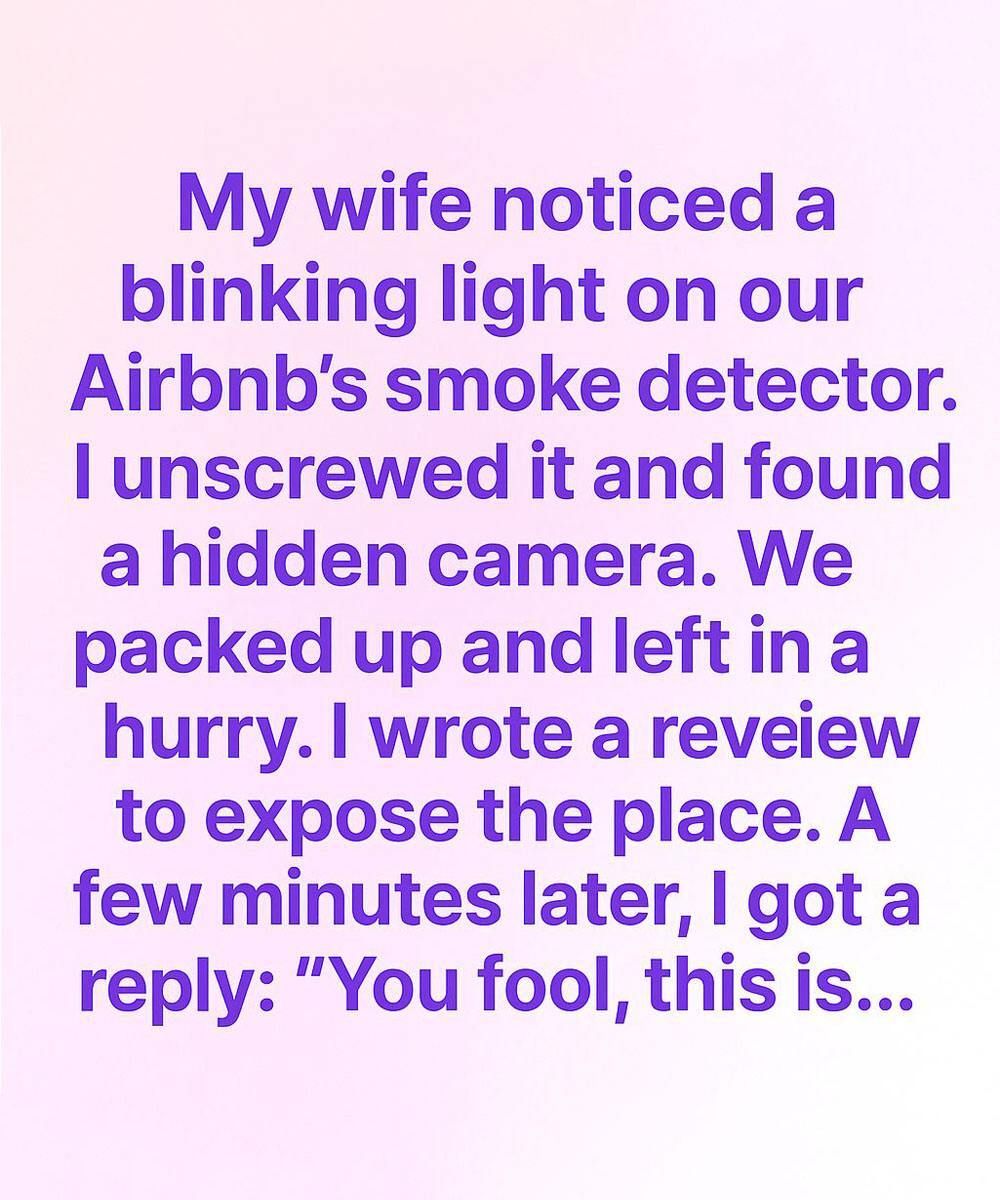Trust and Treachery: A Vacation Rental Nightmare
When planning a trip, it’s natural to feel a sense of comfort in what seems familiar and safe. A five-star review, polished photos, and a well-known platform like Airbnb promising “verified hosts” and “secure stays” can make travelers breathe easier. For many of us, especially those who’ve spent decades on the road, safety often comes in the form of routines, familiar patterns, and trusted signs.
But what happens when those signs betray you? When the very walls that should provide shelter hide something dark? When the comfort you clung to turns out to be a carefully constructed illusion?
This isn’t just a story about a hidden camera in an Airbnb. It’s a cautionary tale about how delicate safety can be in the modern world of short-term rentals, smart home devices, and digital trust. For older travelers, in particular, who may not be attuned to the latest surveillance technologies, it serves as a stark warning: vigilance is no longer optional.
The Light That Changed Everything
Our weekend getaway started like so many others — filled with anticipation and excitement. My wife and I had booked a charming Airbnb, a cozy home with glowing reviews and carefully curated photos. The price seemed reasonable, the location perfect, and after hours on the road, we were ready to relax.
As we unpacked, my wife noticed a faint, blinking light on the smoke detector.
“Probably just a battery,” I said, brushing it off. But the look in her eyes told me something was wrong. Something in her instinct screamed caution. I climbed the ladder, unscrewed the cover, and froze.
Behind the plastic casing, a tiny lens glinted.
A hidden camera.
In that moment, the world tilted beneath me. My chest tightened, my stomach knotted. Without thinking, I started stuffing our belongings back into the suitcases. Minutes later, we were speeding away, leaving the house that should have been a safe retreat behind.
From Relief to Fear
We stopped at a diner two towns away, trying to catch our breath under the harsh fluorescent lights. I opened my laptop and typed a warning review for future travelers. I expected the host to respond slowly — or not at all. But minutes later, a notification appeared:
“You fool. That wasn’t a camera. That was the transmitter for our private security system. Now you’ve broken it — and they’ll come looking for it.”
“They?”
The word froze me. Who were they? And why would they be coming after us?
My hands trembled as I scrolled through the photos I’d taken earlier. Then I noticed it: a tiny red dot reflected on the curtain. Not from the smoke detector. Not from a battery. From what unmistakably looked like a laser.
This wasn’t just about spying. This was something much larger, far more calculated.
The Airbnb That Wasn’t
The more I thought about it, the more chilling the truth became. That property wasn’t a cozy vacation rental. It was a front, a trap designed to observe, record, and perhaps track those who stayed there. The glowing reviews? Likely fabricated. The perfectly staged photos? Carefully designed illusions.
We weren’t visitors. We were unwitting subjects in a setup that had been planned long before we booked it.
Breaking the Connection
We drove for hours, putting as much distance as possible between ourselves and that house. By the time we reached a hotel in the next city, fatigue had set in — but so had a gnawing fear.
I pulled out the inexpensive prepaid phone I had used to book the Airbnb. Without hesitation, I smashed it to pieces. If we were being tracked, this was the only way to cut the link.
The next morning, I filed a police report, describing the camera, the host’s reply, and the mysterious red dot in the photo. Deep down, I wondered: would anyone take it seriously? Could authorities trace something designed to be invisible?
A Lesson No Traveler Wants to Learn
That night, lying awake in a hotel bed with my wife beside me, a harsh truth settled in. Safety, the thing we rely on so heavily when traveling, is fragile. We trust five-star reviews, polished photos, and promises of verification. But the reality is sobering: not every wall that looks warm and inviting is built to protect you. Sometimes it’s a trap, and sometimes a blinking light is more than a battery signal.
For older travelers, who may be less familiar with modern surveillance methods, vigilance is critical. Here’s how to protect yourself:
Inspect the Room Thoroughly
Check devices like smoke detectors, alarm clocks, and even electrical outlets. Hidden cameras can masquerade as everyday objects.
Use Your Phone to Detect Devices
Smartphones can help detect hidden lenses. Turn off lights, shine your flashlight around, and look for reflections. Some apps can scan for unusual Wi-Fi signals, hinting at surveillance devices.
Trust Your Instincts
If something feels wrong — a light where it shouldn’t be, a device that seems out of place — don’t ignore it. Experience and intuition are powerful tools.
Control Your Connections
Use a personal hotspot instead of the rental’s Wi-Fi. Unsecured networks can expose personal data.
Leave and Report Immediately
If you find anything suspicious, prioritize your safety over the booking. Report the issue to the platform and local authorities.
The Reality of Modern Travel
Travel today is convenient, but it comes with risks we never imagined. Hidden cameras, fraudulent listings, and advanced surveillance are real dangers — especially for those less tech-savvy. Trust cannot be assumed.
For us, one night in a small-town rental changed everything. We no longer assume that a polished listing equates to safety. Every trip now begins with caution, awareness, and the understanding that true security starts with us.
Perhaps that is the lesson every traveler — young and old — needs to carry: vigilance isn’t paranoia; it’s survival.
